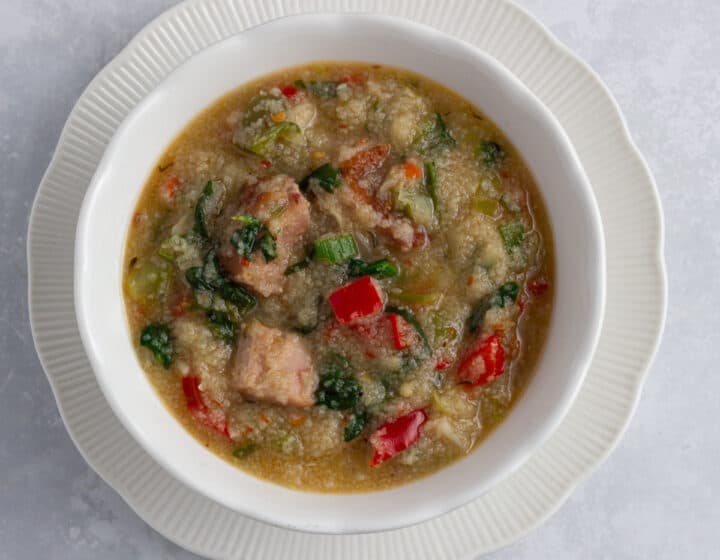 |
| Gwote. Source:https://eatwellabi.com |
Gwote is a semi-solid meal of crushed cereal and vegetable salad. The cereal could be maize, guinea corn, rice or hungry-millet, while the vegetable mix draws its sources from spinach, cabbage, lettuce, garden eggs, spring onion, sorrel leaves, carrots, beans, ginger, garlic, etc. The leaf sources could also be wild, but edible.
Gwote is native to most northern Nigerian communities. In Plateau State, it is native to the North, mostly. When people from the central and southern Plateau migrate to the north of the state, they often look at gwote with scorn. It is the same with Nigerians from the south.
Traditionally, it is prepared without adding salt. This is the fundamental reason why people find it difficult to eat it. Cultural reasons could also be why people could find exotic meals unattractive. What makes a meal great? It is the taste, nutritional content and freedom from taboos. The cereals like maize and guinea corn are universally eaten. The leaves mentioned are also universally eaten. So, there aren't any taboos! And, as mentioned before, gwote is porridge of cereal, infused with vitamins from a salad. Thus, if you like a salad for its nutritional content, you should also like gwote. Moreover, it is not a must that it is taken without salt and oil. There are common variants that incorporate oil, salt and even meat.
During festive periods, like Christmas, when oily meals are all over the place, people eat a lot of oil-free gwote to clean up oily (and thus) morbid stomachs, thereby restoring cravings.
In Plateau State, it is mostly taken at lunch. Thus, it is the most eaten meal on farms. A colleague from Central Plateau told me that where he comes from, gwote is considered a token of poverty. So, I asked him what they eat when they go to farms in their regions. He replied that they prefer to take kunu. This underscores the irony. Tell me, between gwote and kunu, which one symbolizes poverty? It is kunu, which is merely a suspension of powdered cereal. Thus, this view of gwote as a sign of poverty smacks of illiteracy.
So, strangers ask, "how will I take a meal without salt or sugar?" It takes just getting used to it. Though salt isn't added, some flavouring make up for its absence. The flavouring comes from sorrel, which gives a subtle sour taste. Sour flavour also comes from garden eggs.
Another northern meal that strangers find exotic is sesame leaf soup. In Hausa, it is known as karkashi. It draws just like okra, but the elastic property can be lost if the cook is not careful, just as in the case of okra. The soup can be eaten with any carbohydrate swallow such as tuwo, akpu, amala, etc.
In Nigeria, tribes that find karkashi exotic are mostly Igbos and southern minorities, especially the South-south. The irony though is that it is a meal that is very nutritious and medicinal. It can cure certain illnesses and prevent others. Thus, it helps in cases of hepatitis, typhoid and malaria.

.png)





